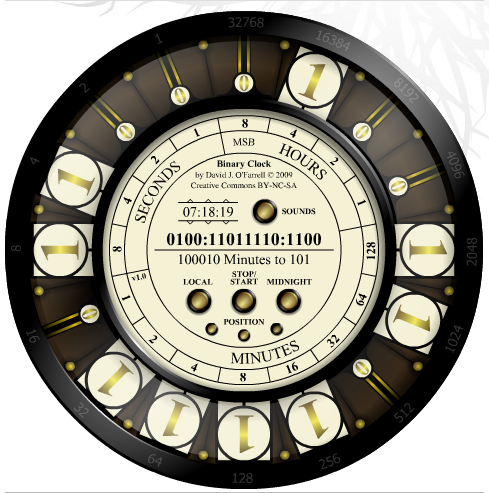I have always of course been partial to my own True Binary Clock, but I recently came across another based on the same idea, but with pretty graphics (and sound!):
This is the Steampunk Binary Clock from ruinsofmorning.net. Very cool, although I’m not so hot on the idea of grouping all eight middle bits into “minutes”, I prefer counting each group of four bits seperately.
Also of note at the same site, the HexClock, which is basically the same sort of thing again, but showing the same 16 bit version of time as four hexadecimal digits, which is actually quite nice. (He still groups the middle two bits though.)
I would buy a physical version of my clock, or either of these two clocks in a heartbeat if someone was selling them.
Very cool.
[Edit 07:48 UTC to add the parenthetical statement and fix some punctuation.)

From VH via Facebook:
So is Abulsme Time a binary time calculation? I don’t think I ever knew that.
(11 minutes ago)
From SM via Facebook:
You may be thinking of SFT, which I used during high school, which was different and simply subtracted one from the year month and day to make them all zero based like hour minutes and seconds (which I used GMT for). Or the Julian Date, which I used during college, which was also different and is the number of days since January 1, 4713 BC Greenwich noon, Julian proleptic calendar and actually is used outside of the world of Sam as well. :-)
Neither of those were related to these sorts of binary time things. I set up my binary clock thing in January 2005 after being annoyed that the ThinkGeek Binary Clock just represented standard Hours Minutes and Seconds as binary numbers, rather than really being a device to measure time using a binary system natively.
(2 seconds ago)
From VH via Facebook:
Ah, thanks for the explanation. I think I was just generally confused because I didn’t realize you had switched between HS and college. Binary time is geek chic, pretty much however you slice it, but I agree that just using binary representations of the decimal digits of a normal clock is lame and a bit of a cheat. I’ve been pondering ways to … Read Morechange the calendar to be more systematic and less archaic (like modifying a “year” to have 1461 days, but the prime factorization is 487*3, which isn’t very user-friendly). Do you have any references for that kind of thing?
(Sun at 11:16am)
From SM via Facebook:
I don’t have any references on that, no. Question though, what is the thought behind 1461? Is it just the fact that it works out so very very close to exactly four “actual” years? (4.00008544 I believe it is) so you would have to mess with “leap days” much much less often?
I guess that makes some sense, but it seems like if you were trying to make a rationalized calendar system you’d either want to make your “base unit” one of the “natural cycles”… basically a year (for the sun), a month (for the moon) or a day (for the earth) and build from there, or decide that those physical connections were not really relevant and base things on Metric seconds or something. (Ms, Gs, Ts, etc.)
The problems always come whenever you try to reconcile the natural units… worrying about how many days fit in a year, etc… Seems like you should just pick which cycle you care most about and then base everything off that and don’t worry about how it lines up with the the cycles… or just ignore the cycles entirely and go with something like just the number of seconds since some reference time. I kinda like that one. :-) (And of course this kind of system is used commonly in many computer systems.)… Read More
Of course, change that to days past a reference time, and you have the Julian Date, which of course also actually is commonly used.
Now, to get the general public to use those systems… I could see that being challenging. :-)
(2 seconds ago)